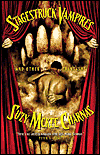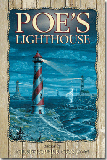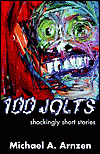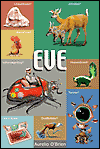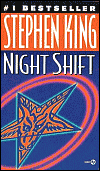
Night Shift, by Stephen King
Book Review by Jeff Edwards
Have you read this book?
Night Shift is a collection of twenty short stories, many originally published in the men's magazine Cavalier between 1970 and 1975. The best are gripping tales of dread and horror. The worst prove that even a "master of the macabre" can't always craft a good story from unworthy material.
King does his best work when building friction between his main characters. In "Children of the Corn," a bickering couple driving through Nebraska discover an isolated town and a twisted religion. As the story opens, the wife asks, "Where are we, anyway?" The husband answers, "Nebraska," and the wife replies, "Yes, Burt. I know we're in Nebraska, Burt. But where the hell are we?" Immediately, the reader is riding along in the car with Vicky and Burt, a fellow passenger - and an eyewitness to the terror in the small town of Gatlin. More compelling than the creature in the cornfields is the way that the husband and wife inflict petty injuries on each other and ignore each other's feelings out of stubbornness - like the way Burt lingers in the town even though he knows that something is very wrong, the way he insists on investigating the empty church even though Vicky is so frightened that she begs him not to leave her alone in the car.
In "Graveyard Shift," a textile mill worker plays a deadly game of chicken with his foreman as they descend into the mill's cellar. More gripping than the rodents they find is the antagonistic relationship between Hall, the college-educated drifter, and Warwick, the insensitive foreman. Warwick repeatedly refers to Hall with disdain as "college boy" and never eases up on the mill workers, despite the futility of their special clean-up project, the growing number of men suffering from rat bites, and the ever-increasing size of the rats they encounter while venturing deeper into the cavernous passageways beneath the mill.
King shows that he can write strong thrillers here, too. In "The Ledge," a cuckolded husband forces a man to walk the five-inch ledge outside of his penthouse apartment, forty-three stories up. "Quitters, Inc." concerns a company that uses pragmatic methods to help smokers kick the habit - or else.
Night Shift offers some welcome links to King's novels: "Night Surf," with its small group of A6 flu survivors, is a kind of precursor to "The Stand"; "Jerusalem's Lot" is a tenuous prequel to "Salem's Lot" and an homage to H.P. Lovecraft, complete with a character screaming, "Servant of Yogsoggoth, the Nameless One! The Worm from beyond Space! Star-Eater!" before fleeing from the beast living beneath a desecrated church; and "One for the Road" is a short sequel to "Salem's Lot," in which unlucky out-of-towners are trapped in The Lot during a snowstorm.
Some of the weakest tales in the collection are about mankind's creations running amok, or man's own body turning against him. No matter how strong King's writing is, or how solid the narrative structure, or how vivid the dialogue, ultimately some of the outlandish plots prove to be too much weight for the stories to bear. For example, in "The Mangler," an industrial speed ironer/folder develops a taste for blood. Despite King's masterful handling, the idea of a piece of industrial laundry equipment "trying to pull itself out of the concrete, like a dinosaur trying to escape a tar pit" and then chasing a man down the street is simply too ridiculous. Likewise, in "Gray Matter," the image of "a huge gray wave of jelly, jelly that looked like a man, and leaving a trail of slime behind it" breaks the spell of the well-told but ludicrous tale of a man who drinks an infected beer and slowly changes into a mass of gelatinous ooze.
Although King manages to shoehorn four non-horror stories into Night Shift, he fully embraces the label of "horror writer" in this 1978 collection. His previous books ("Carrie," "Salem's Lot," "The Shining") were clearly horror, yet it seemed obvious from the quality of his writing and the underlying issues he examined (the social battlefield that is high school, the subtle forms of evil festering within our own homes) that King could write literary fiction, if he chose to do so. In the foreword to Night Shift, King answers the unspoken question of why he continues to write genre fiction with a question of his own: "Why do you assume that I have a choice?"
King does his best work when building friction between his main characters. In "Children of the Corn," a bickering couple driving through Nebraska discover an isolated town and a twisted religion. As the story opens, the wife asks, "Where are we, anyway?" The husband answers, "Nebraska," and the wife replies, "Yes, Burt. I know we're in Nebraska, Burt. But where the hell are we?" Immediately, the reader is riding along in the car with Vicky and Burt, a fellow passenger - and an eyewitness to the terror in the small town of Gatlin. More compelling than the creature in the cornfields is the way that the husband and wife inflict petty injuries on each other and ignore each other's feelings out of stubbornness - like the way Burt lingers in the town even though he knows that something is very wrong, the way he insists on investigating the empty church even though Vicky is so frightened that she begs him not to leave her alone in the car.
In "Graveyard Shift," a textile mill worker plays a deadly game of chicken with his foreman as they descend into the mill's cellar. More gripping than the rodents they find is the antagonistic relationship between Hall, the college-educated drifter, and Warwick, the insensitive foreman. Warwick repeatedly refers to Hall with disdain as "college boy" and never eases up on the mill workers, despite the futility of their special clean-up project, the growing number of men suffering from rat bites, and the ever-increasing size of the rats they encounter while venturing deeper into the cavernous passageways beneath the mill.
King shows that he can write strong thrillers here, too. In "The Ledge," a cuckolded husband forces a man to walk the five-inch ledge outside of his penthouse apartment, forty-three stories up. "Quitters, Inc." concerns a company that uses pragmatic methods to help smokers kick the habit - or else.
Night Shift offers some welcome links to King's novels: "Night Surf," with its small group of A6 flu survivors, is a kind of precursor to "The Stand"; "Jerusalem's Lot" is a tenuous prequel to "Salem's Lot" and an homage to H.P. Lovecraft, complete with a character screaming, "Servant of Yogsoggoth, the Nameless One! The Worm from beyond Space! Star-Eater!" before fleeing from the beast living beneath a desecrated church; and "One for the Road" is a short sequel to "Salem's Lot," in which unlucky out-of-towners are trapped in The Lot during a snowstorm.
Some of the weakest tales in the collection are about mankind's creations running amok, or man's own body turning against him. No matter how strong King's writing is, or how solid the narrative structure, or how vivid the dialogue, ultimately some of the outlandish plots prove to be too much weight for the stories to bear. For example, in "The Mangler," an industrial speed ironer/folder develops a taste for blood. Despite King's masterful handling, the idea of a piece of industrial laundry equipment "trying to pull itself out of the concrete, like a dinosaur trying to escape a tar pit" and then chasing a man down the street is simply too ridiculous. Likewise, in "Gray Matter," the image of "a huge gray wave of jelly, jelly that looked like a man, and leaving a trail of slime behind it" breaks the spell of the well-told but ludicrous tale of a man who drinks an infected beer and slowly changes into a mass of gelatinous ooze.
Although King manages to shoehorn four non-horror stories into Night Shift, he fully embraces the label of "horror writer" in this 1978 collection. His previous books ("Carrie," "Salem's Lot," "The Shining") were clearly horror, yet it seemed obvious from the quality of his writing and the underlying issues he examined (the social battlefield that is high school, the subtle forms of evil festering within our own homes) that King could write literary fiction, if he chose to do so. In the foreword to Night Shift, King answers the unspoken question of why he continues to write genre fiction with a question of his own: "Why do you assume that I have a choice?"
|
Click here to buy Night Shift, by Stephen King on Amazon
|
Night Shift, by Stephen King on Amazon

| More Books You Might Like |
Comment on Night Shift, by Stephen King
| Comments on Night Shift, by Stephen King |
| There are no comments on this book. |

